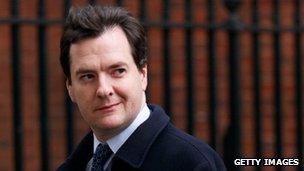The Bank, the OBR and Mr Osborne
- Published
- comments

George Osborne's Statement was not as bad as some had feared
There are two pleasant surprises in this Autumn Statement, for everyone, perhaps, except Her Majesty's opposition.
The first was much in evidence in the chancellor's speech: borrowing will fall, not rise, this year, despite almost universal forecasts that it would go up.
The other was not: the Office for Budget Responsibility (OBR) has become a bit more optimistic about underlying state of the economy, and that has meant that the chancellor's target measure of the deficit has not increased as much as expected. He can still say that this borrowing is lower than in 2010-11. But £59bn of austerity has still only reduced it by around half-a-percentage point of GDP, to 4.3%.
The OBR is now a bit gloomier about the longer-term capacity of the economy, meaning they think our potential output will be about 1.3% of GDP smaller than previously thought by 2017. But that is a small change, relative to the big downgrade in the forecast a year ago.
There are plenty of odd things going on with the "headline" measure of borrowing this year - including not just the transfer of the Royal Mail pension fund, but the raid on the Bank of England's Asset Purchase Facility and reclassification of Bradford & Bingley. In his speech, George Osborne insisted that borrowing was falling, despite these oddities.
And that is true. Table 1.3 of the Autumn Statement document, external (on page 14) confirms that.
But, the borrowing would not have fallen this year, without the £3.5bn proceeds from auctioning the 4G spectrum. In that sense, it is thanks to another one-off factor. Though Danny Alexander has just entered the BBC studio, as I write this, and told me there are one-off asset sales like this every year. So that's alright then.
What about that other surprise? As I wrote in my earlier blog, the IFS and pretty much every other economic forecaster expected the OBR to raise its estimate of the structural current deficit, given what we knew about the way they forecast these things. We also thought they would probably cut or leave unchanged their estimate of spare capacity in the economy (the "output gap") - again, on the basis of their calculations in March.
In fact, they have increased the structural current deficit in 2012-13 only slightly: from 4.2% to 4.3% of GDP. Allowing for the effect of transferring the interest income that the Bank of England has earned as a result of quantitative easing, that measure of borrowing has actually fallen for the remaining years of the Parliament. Without that transfer, structural borrowing is higher in future years - around 0.6% of GDP higher, by 2015-16.
I will need more time to read the details, but if the OBR thinks those transfers from the Bank affect the structural borrowing picture significantly, then clearly it believes - as I did predict a few weeks ago - that quantitative easing has permanently improved the public finances.
To be clear, this is not due to the recent change in the way the interest payments are classified. The OBR has taken a look at the quantitative-easing policy and decided, over the course of its life, it will be a net positive for the chancellor. As I say, I need to check the details, but that is how it looks.
Also interesting is what the OBR has done to their estimate of Britain's room to grow: "our latest estimate of the output gap is significantly wider than we thought in March, in each year of our forecast." In explaining this, they say - in effect - that they looked at what the output gap would be, on the basis of their previous "cyclical indicators' approach, and decided it wasn't plausible. So they changed the model.
The funny thing is, the new forecast shows the chancellor eliminating that measure by 2016-17, as before. So why the extra year of austerity in 2017-18?
The explanation, again, is that he only achieves that with the help of the expected transfers from the Bank of England, thanks to quantitative easing. Otherwise, it would take until 2017-18 (see Table 1.6 of the Green Book).
Perhaps the chancellor does not want it to be said that he has benefited - even in this small way - from the disastrous performance of the economy that has made all that quantitative easing necessary.